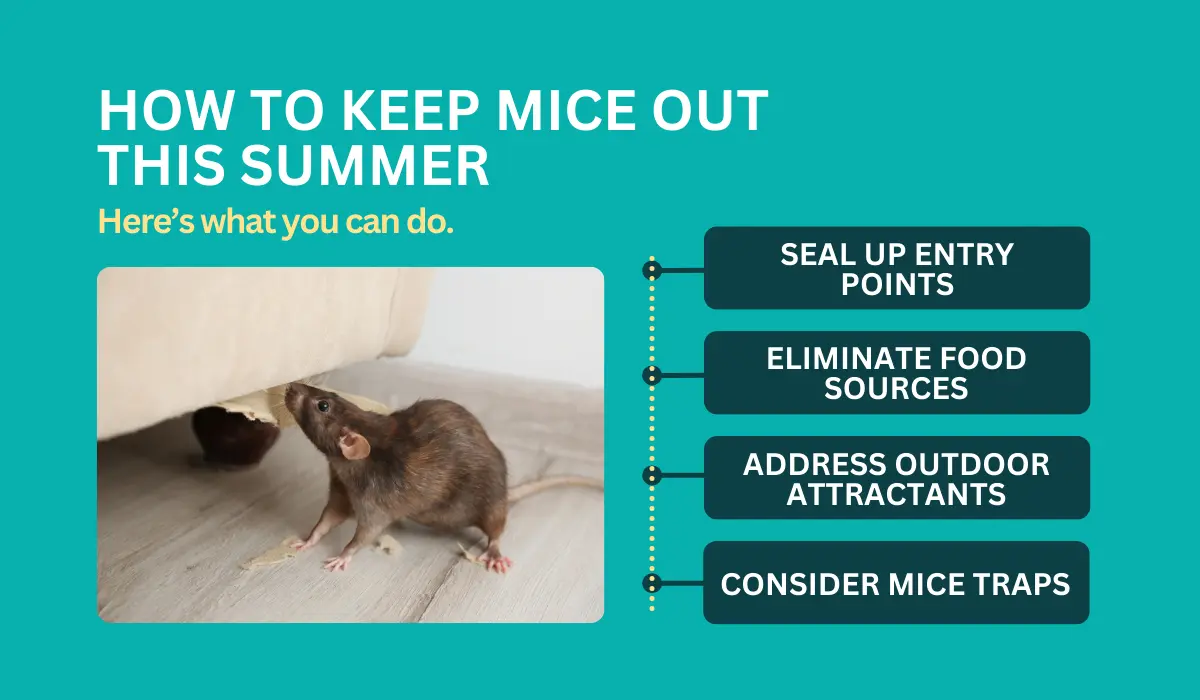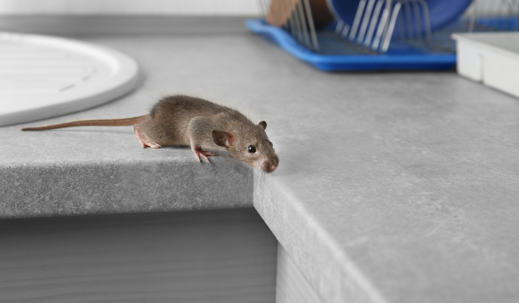Why Are There More Mice in Your House During Summer?
Summer's arrival doesn't just bring sunshine and relaxation to Florida; it can also usher in unwelcome visitors – mice.
While you might be dreaming of poolside lounging, these pests are on the lookout for a cool escape from the scorching heat, and your house might be the perfect target.
Do you know where those hidden entry points are in your home? Keep reading to discover how mice sneak in and how to keep them out.
Key Takeaways
- Mice often seek cooler indoor environments like basements and attics during summer to escape the heat, leading to more frequent sightings.
- Increased summer activity and breeding amplify the likelihood of mice entering homes in search of food and safe nesting sites.
- Identifying a mouse infestation involves looking for signs such as droppings, gnaw marks, nests, and a stale odor, especially in secluded areas.
- Preventing mice infestations in summer includes sealing up entry points, eliminating indoor food sources, addressing outdoor attractants, and considering professional pest control.
Why Do Mice Come in the House in Summer
Many folks believe mice are more common in the summer. This thought comes from seeing more mice during warmer months, whether inside or outside the home.
However, they can also cause trouble in the winter months. Since they need a consistent supply of essentials regardless of the season, they take advantage of any opportunity year-round.
Here are some reasons why you may seem to see them more during the summer months:
Seeking Relief From The Heat
During hot weather, mice may seek cooler environments. That’s why they often end up in your home, where they can avoid the sweltering summertime heat.
With the rising temperatures, they see your home as ideal, featuring cooler basements, shaded attics, and air-conditioned rooms.
Increased Activity And Breeding
Summer provides favorable conditions for mice to be more active and breed. With ample food available and favorable conditions, their population can quickly grow.
During this time of year, they are more likely to venture out and find new nesting sites. This increased activity also means they are more likely to come into your home in search of food sources or a safe place to raise their young.
What Are the Signs of Mice Infestation
Finding out if there's a mouse infestation in the house can be tricky sometimes. Here are some common signs to look out for:
Signs | How to Spot Them |
Droppings | Small, dark, pellet-shaped mice feces found near food, drawers, sinks, and along walls |
Gnaw Marks | Tiny bite marks on furniture, wires, and food packaging |
Nests | Shredded paper or fabric hidden in secluded areas like wall cavities or behind appliances |
Noises | Scurrying sounds, especially at night, in walls and ceilings |
Tracks | Footprints and tail marks in dusty areas, use a flashlight to spot |
Grease Marks | Smudges along regular pathways on walls and floors |
Strong Smell | A stale, musky odor from accumulated droppings and urine over time |
How To Keep Mice Out This Summer

During the summer, a rodent infestation can be a problem you can avoid. Since they carry diseases like hantavirus and pests like fleas, keeping them out this summer is essential.
Here’s what you can do.
Seal Up Entry Points
House mice can enter homes through tiny gaps. They often squeeze through cracks and holes in walls, foundations, and roofs to gain access to cozy indoor spaces.
To effectively seal up entry points, employ these actions:
- Inspect the exterior of your home for gaps and cracks.
- Seal openings with caulk, steel wool, or hardware cloth.
- Check the crawl space and basement for any possible access points.
- Install door sweeps and repair damaged window screens.
Eliminate Food Sources
Food can attract mice from a distance. They often gnaw through packaging and electrical wiring and access stored unprotected items, making your home a prime target.
To minimize food temptations indoors, consider these strategies:
- Store food in airtight containers.
- Clean up crumbs and spills immediately.
- Place pet food in sealed containers.
- Maintain a clean kitchen and avoid leaving food out overnight.
Address Outdoor Attractants
Outdoor factors like clutter and vegetation can entice mice. These outdoor elements create ideal conditions for mice to hide and thrive before moving indoors.
To deal with outdoor attractions, keep outdoor spaces tidy by:
- Remove woodpiles and debris from around the house.
- Trim back vegetation near the foundation.
- Maintain a clear and clean yard.
- Store firewood at least 20 feet away from the house.
Consider Mice Traps
Traps are an immediate solution to an existing infestation. They help manage and reduce the mouse population within your home quickly and effectively.
Types of traps to consider for rodent control include:
- Snap traps: Effective and widely available.
- Live traps: Humane option to release mice back outdoors.
- Electronic traps: Deliver a quick kill with a small electric shock.
- Glue traps: Less effective but can capture mice in tough spots.
Professional Pest Control Solutions
Professional pest control companies offer various services to tackle rodent problems in homes. In Florida, an experienced exterminator can provide long-term solutions with these mouse control services:
Services | Description |
Inspection | Identify entry points, nesting areas, and signs of activity. |
Sealing Entry Points | Close gaps and cracks to prevent new mice from entering. |
Trapping | Use traps to catch mice and reduce their population. |
Baiting | Apply safe bait to attract and eliminate mice. |
Ongoing Monitoring | Regular check-ups to ensure it stays under control. |
Sanitation Guidance | Advice on keeping the home clean to deter mice. |
When to Call a Professional
Mice can be a nuisance, and sometimes, handling them yourself this summer isn't enough. If mice keep returning despite your efforts, it might be time to call a professional pest control company (like us at Native Pest Management).
As professional mice exterminators, our solutions ensure that homeowners like you can live without worrying about an unwanted mouse problem, especially during the warmer months.
